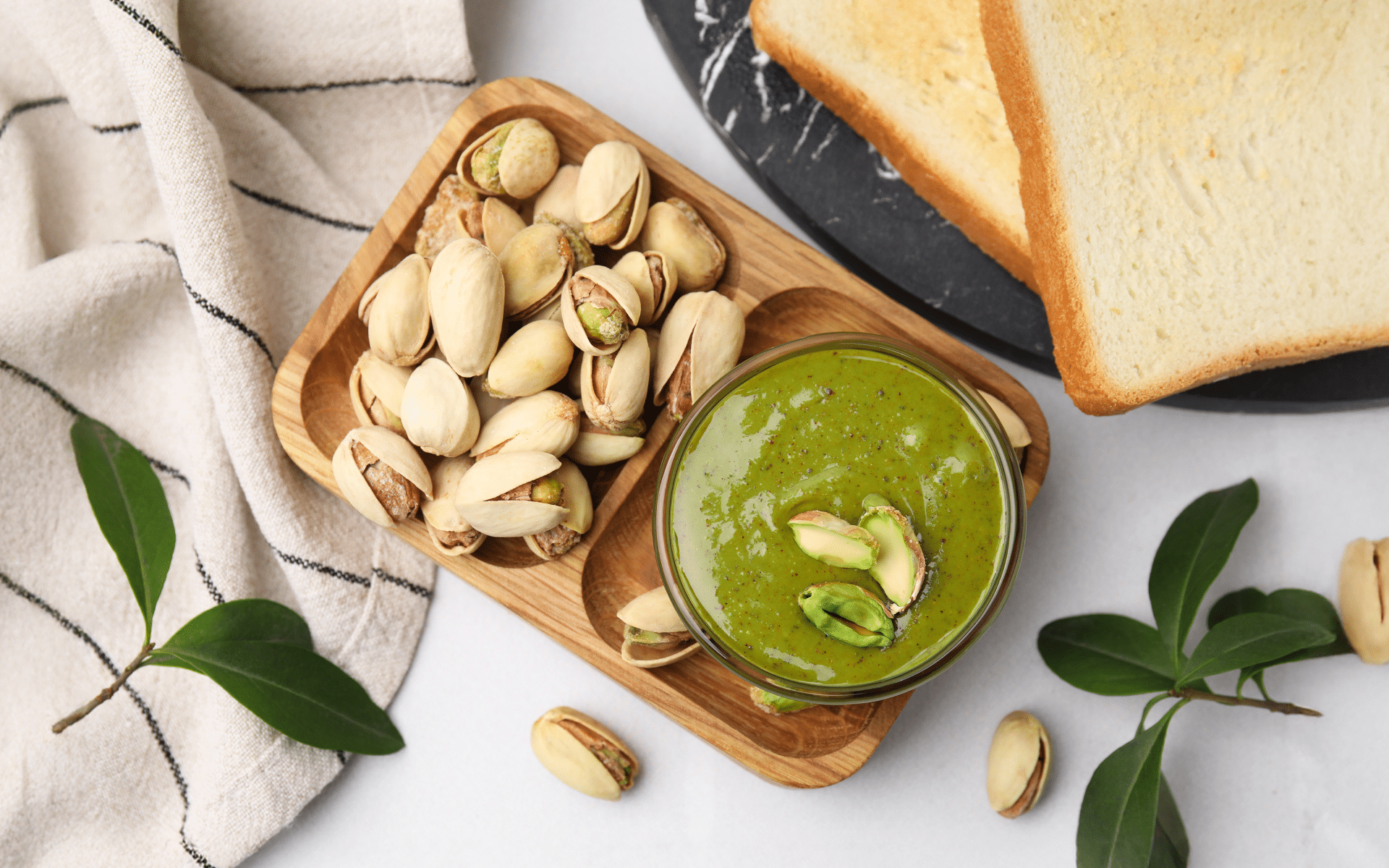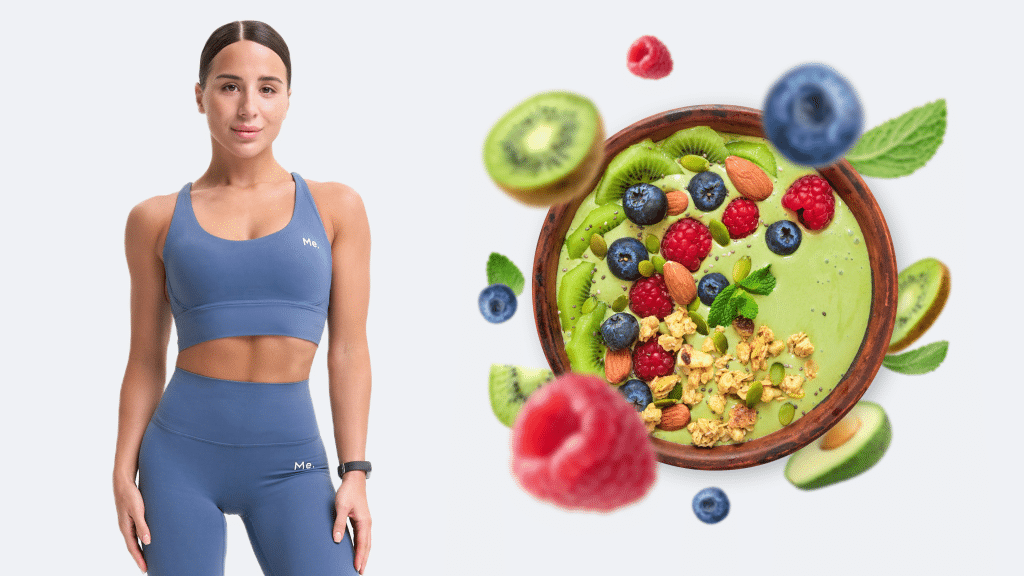People from the Mediterranean region have enjoyed pistachios for centuries. In fact, it is thought that the name “pistachio” comes from a Greek word meaning “nut from Persia”.
Despite having a reputation as a high-fat food, pistachios are actually incredibly healthy and contain many nutrients that are essential to good health. In this article, we’ll consider their nutritional facts to find out what exactly these nuts contain. We’ll also look at some of the important health benefits of pistachios and their side effects.
Pistachios Nutrition Facts
According to the USDA, a – ounce serving of pistachios contains (1):
- Calories: 159
- Carbs: 8 grams
- Fiber: 3 grams
- Protein: 6 grams
- Fat: 13 grams (over 80% are unsaturated fats)
- Potassium: 6% of the daily value (DV)
- Phosphorus: 11% of the DV
- Vitamin B6: 28% of the DV
- Thiamine: 21% of the DV
- Copper: 41% of the DV
- Manganese: 15% of the DV
Health Benefits of Pistachios
Here are some of the important health benefits of pistachios you should know about.
- Cardiovascular Health
Pistachios contain high levels of phytosterols, which have been suggested to help reduce levels of LDL cholesterol. When LDL cholesterol enters the bloodstream in large amounts, it can cause plaque build-up in the arteries and blood vessels, which may lead to heart disease and other cardiovascular conditions over time (2).
If you want to make pistachios part of a regular diet for cardiovascular health, consider snacking on them between your meals or substituting them for snacks such as candy bars or potato chips, which are high in added sugar and unhealthy fats.
- Blood Sugar Control
Pistachios are incredibly healthy for people with diabetes due to their low glycemic index (GI) and glycemic load (GL). Pistachios also contain several nutrients that may be helpful for blood sugar control, including thiamine, vitamin B6, folate, and manganese (2).
If you have diabetes or are at risk of developing the condition, consider substituting pistachios for high-GI foods such as pretzels or potato chips.
- Weight Loss
The combination of protein and fiber in pistachios makes them an incredibly satiating food that can help with weight loss and maintenance (3).
According to epidemiological studies, eating nuts like pistachios is unlikely to cause weight gain, even if it adds calories to your diet (4). The satiating fiber, healthy fat, and protein in nuts may actually reduce subsequent food intake.
In addition, the high concentration of antioxidants in pistachios may help fight obesity-related oxidative stress, which damages the cells throughout the body (5).
For these reasons, it’s a good idea to consider pistachios as part of your daily weight loss regime. Just make sure to eat them in moderation. A recommended portion size is 1 ounce, or approximately 49 kernels. It may be better to eat the ones in the shells, as the visual cue of the empty shells may help tell your brain that you are full. You also eat them more slowly because opening the shells takes time, which gives your brain more time to register fullness.
If you wish to free yourself from all the extra pounds that have been weighing you down for way too long, start using the BetterMe: Health Coaching app and overhaul your entire life!
- Healthy Skin
Vitamin E is an essential nutrient for healthy skin as it helps repair cell damage caused by oxidation and protects against UV radiation from sunlight (6). As pistachios are rich in vitamin E, they’re excellent for maintaining healthy skin (together with daily sunscreen use).
- Oral Health
The high concentration of zinc and selenium in pistachios, together with their low glycemic index, make them a smart choice for oral health (7).
Research has suggested that these nutrients can help prevent tooth decay by reducing the bacteria that cause bad breath and plaque build-up on the teeth (8). Eating pistachios on a regular basis may also reduce your risk of getting cavities as they contain less sugar than most nuts.
- Bone Health
In addition to copper and manganese, pistachios are rich in phosphorus, which is important for healthy bones. In fact, 100 grams of this nut contains more phosphorus than 100 grams of milk (1). These nuts also contain calcium, magnesium, and potassium nutrients that are essential for bone health.
Some studies have even linked higher intakes of dietary calcium with increased bone mineral density in older adults (9).
- Cancer Prevention
The high concentration of antioxidants in pistachios may play an important role in preventing cancer by protecting cells from damage caused by free radicals (2). Pistachios also contain several nutrients that have been linked with a lower risk of certain types of cancer, including:
- A high dietary intake of folate may help protect against cervical, breast, and pancreatic cancers (10).
- People who eat fiber-rich and plant-based diets tend to have a lower risk of developing certain types of cancer (11).
Read more: 5 Banana Bread Muffin Recipe Choices With Golden Brown Tops and Soft Centers
- Mood-Boosting Properties
Pistachios contain moderate amounts of tryptophan, an amino acid the body uses to make serotonin – a neurotransmitter that has mood-boosting effects on the brain. According to research, snacking on nuts may help elevate your mood and improve symptoms associated with depression (12).
- Improved Eye Health
Pistachios may protect against age-related eye diseases such as cataracts and macular degeneration (7, 13).
Research has shown that eating nuts like pistachios on a regular basis can increase blood levels of lutein and zeaxanthin, two key nutrients for good vision health. In fact, some studies have found that people with higher intakes of these nutrients have a lower risk of cataracts or macular degeneration as they age (14).
- Promote Healthy Gut Bacteria
Pistachios are rich in prebiotic fibers, which function as “food” for healthy bacteria in the gut (15). A healthy microbiome can help improve digestive health and support immune function in the body (16).
- Formation of Collagen
Collagen is a protein that is found throughout the body that maintains strength and elasticity in connective tissue such as skin, hair, nails, ligaments, tendons, cartilage, bones, teeth, gums, and blood vessels (17).
Collagen production slows down with age resulting in weaker skin tissue (18). A lack of collagen can also increase your risk factors for various ailments, including osteoporosis (19).
To compensate for this loss of collagen over time you need to increase your consumption of foods rich in proline and hydroxyproline, the two amino acids that help build collagen. Studies indicate that 60% to 70% of dietary proline is usually converted into these two compounds (20). Pistachios are one of the best sources of dietary proline.
- May Promote Muscle Recovery
In comparison to other tree nuts, pistachios have a high protein quality score (21). They are also a rich source of leucine, one of the three branched-chain amino acids (BCAAs).
These three amino acids – leucine, isoleucine, and valine – are particularly important for building and repairing muscles. The high BCAAs and amino acids in pistachios help promote muscle recovery after exercise (22).
Side Effects of Eating Too Many Pistachios
There are several reasons why you should moderate your consumption of these nuts, including:
Increased Risk of Gout Flares
Pistachios contain high levels of purine, a compound that breaks down into uric acid in the body and increases your risk of gout flare-ups if you have a history of them (23).
Digestive Issues
Consuming too many pistachios may also cause digestive issues as they are difficult to digest and can irritate the gastrointestinal tract when eaten in excess (24).
May Worsen Kidney Issues
People who suffer from kidney disease should avoid eating large amounts of pistachios. This is because pistachios are high in potassium, phosphorus, and magnesium, which can build up in the blood when kidney function is impaired (25).
Allergic Reactions
Pistachio nuts may be responsible for triggering an allergic reaction in people who are sensitive to them, or to tree nuts in general. This can lead to hay fever, asthma, hives, rashes, or breathing difficulties. The best way to treat a pistachio allergy involves avoiding pistachios entirely (26).
Read more: What Are Microgreens? Uses, Benefits, Cons, and Growing Tips
What Happens to Your Body When You Eat Pistachios Every Day?
Eating pistachios every day may help support heart health, help with blood sugar control, support weight management, enhance gut health, and provide essential nutrients, potentially protecting against cognitive decline (7).
While eating pistachios daily offers many health benefits, there are some considerations you should keep in mind:
- Calorie Intake: Pistachios are calorie-dense, so it’s important to consume them in moderation to avoid excessive calorie intake.
- Allergies: Some people may be allergic to nuts, including pistachios, which can cause severe reactions (26).
- Sodium Content: If you choose salted pistachios, be mindful of the added sodium, which can affect blood pressure (27).
Generally, as long as they’re consumed in moderation and you’re not allergic, pistachios can be a healthy addition to your diet.
Whether you’re a workout beast or just a beginner making your first foray into the world of fitness and dieting – BetterMe has a lot to offer to both newbies and experts! Install the app and experience the versatility first-hand!
Who Shouldn’t Eat Pistachios?
While they’re nutritious and beneficial for many, pistachios aren’t suitable for everyone. People with tree nut allergies should avoid pistachios as they can cause allergic reactions that range from mild to severe. Symptoms may include itching, swelling, or even more serious reactions such as breathing difficulties (24).
In addition, some individuals may have nut intolerances, which can lead to digestive discomfort. This may manifest as diarrhea, gas, or bloating after you consume pistachios (24).
For those who are watching their calorie intake, it’s important to remember that pistachios are calorie-dense. While they can be part of a healthy diet, eating them in large quantities may not align with calorie-restricted dietary goals. Therefore, moderation is the key to enjoying pistachios without overindulging.
Yes, pistachios can have an impact on hormones, particularly those related to stress and metabolism. Pistachios are rich in magnesium, a mineral that helps regulate cortisol, the stress hormone (28). In addition, they contain compounds such as phytoestrogens, which are plant-based substances that can mimic estrogen in the body to a certain extent (29). This may influence hormonal balance, but the effect is generally mild and usually not a problem for most people. Pistachios are particularly beneficial for the heart. They are packed with healthy fats, antioxidants, and nutrients such as potassium, which support cardiovascular health. Eating pistachios instead of other foods that are high in saturated fat can help lower bad cholesterol (LDL), reduce inflammation, and improve blood vessel function (30). In addition, pistachios benefit the digestive system as their fiber content promotes gut health by fostering the growth of good bacteria in the intestines (2). A single pistachio nut contains about 4 calories (1). This can vary slightly depending on the brand and preparation, but pistachios are relatively low in calories in comparison to other nuts. They’re an excellent choice for snacking as they provide a balance of protein, healthy fats, and fiber without an excessive calorie load. Yes, you can drink water after eating pistachios, and there’s no evidence that suggests it causes any negative effects. Drinking water can actually help with digestion (31), particularly if you’ve consumed salted pistachios, as it helps balance the sodium levels in your body. However, you should opt for unsalted pistachios if you’re concerned about sodium intake.Frequently Asked Questions
Do pistachios affect hormones?
What organ are pistachios good for?
How many calories are in 1 pistachio?
Can I drink water after eating pistachios?
The Bottom Line
Pistachios are one of the healthiest nuts you can eat. They are versatile ingredients that can be used to make healthy snacks or enjoy as they are as a part of a low-carb diet.
These nuts are also an ideal snack option for individuals who are trying to lose weight as they’re filled with fiber, plant-based protein, and healthy fats that help control hunger without containing too many calories.
You should be mindful of the sodium content if you choose salted nuts. Eating the kind in the shell will probably slow you down and allow your brain to realize you are full. Consuming too many pistachios may interfere with your weight loss goals, so stick to 1 ounce per day for optimal results when you’re trying to slim down.
DISCLAIMER:
This article is intended for general informational purposes only and does not serve to address individual circumstances. It is not a substitute for professional advice or help and should not be relied on for making any kind of decision-making. Any action taken as a direct or indirect result of the information in this article is entirely at your own risk and is your sole responsibility.
BetterMe, its content staff, and its medical advisors accept no responsibility for inaccuracies, errors, misstatements, inconsistencies, or omissions and specifically disclaim any liability, loss or risk, personal, professional or otherwise, which may be incurred as a consequence, directly or indirectly, of the use and/or application of any content.
You should always seek the advice of your physician or other qualified health provider with any questions you may have regarding a medical condition or your specific situation. Never disregard professional medical advice or delay seeking it because of BetterMe content. If you suspect or think you may have a medical emergency, call your doctor.
SOURCES:
- Nuts, pistachio nuts, raw (2019, fdc.nal.usda.gov)
- Pistachios for Health: What Do We Know About This Multifaceted Nut? (2016, ncbi.nlm.nih.gov)
- Optimising foods for satiety (2015, sciencedirect.com)
- Nut intake and adiposity: meta-analysis of clinical trials (2013, sciencedirect.com)
- Why Should Pistachio Be a Regular Food in Our Diet? (2022, ncbi.nlm.nih.gov)
- Vitamin E – Health Professional Fact Sheet (2021, ods.od.nih.gov)
- Pistachio Nuts (Pistacia vera L.): Production, Nutrients, Bioactives and Novel Health Effects (2021, ncbi.nlm.nih.gov)
- Relation of Trace Elements on Dental Health (2018, intechopen.com)
- The Role of Calcium in Human Aging (2015, ncbi.nlm.nih.gov)
- Folate and Its Impact on Cancer Risk (2018, ncbi.nlm.nih.gov)
- Use of Dietary Fibers in Reducing the Risk of Several Cancer Types: An Umbrella Review (2023, ncbi.nlm.nih.gov)
- Nut consumption is associated with a lower risk of depression in adults: A prospective analysis with data from the UK Biobank cohort (2023, clinicalnutritionjournal.com)
- Pistachio Consumption Increases Macular Pigment Optical Density in Healthy Adults: A Randomized Controlled Trial (2024, sciencedirect.com)
- The Effect of Lutein on Eye and Extra-Eye Health (2018, ncbi.nlm.nih.gov)
- Effects of Peanuts and Pistachios on Gut Microbiota and Metabolic Syndrome: A Review (2023, ncbi.nlm.nih.gov)
- The Interplay between the Gut Microbiome and the Immune System in the Context of Infectious Diseases throughout Life and the Role of Nutrition in Optimizing Treatment Strategies (2021, ncbi.nlm.nih.gov)
- Collagen Structure, Synthesis, and Its Applications: A Systematic Review (2022, ncbi.nlm.nih.gov)
- Decreased Collagen Production in Chronologically Aged Skin: Roles of Age-Dependent Alteration in Fibroblast Function and Defective Mechanical Stimulation (2016, ncbi.nlm.nih.gov)
- Osteoporosis, a unitary hypothesis of collagen loss in skin and bone (2005, sciencedirect.com)
- Proline-dependent regulation of collagen metabolism (2019, ncbi.nlm.nih.gov)
- Believe It or ‘Nut’: Why It Is Time to Set the Record Straight on Nut Protein Quality: Pistachio (Pistacia vera L.) Focus (2023, ncbi.nlm.nih.gov)
- Pistachios as a recovery food following downhill running exercise in recreational team‐sport individuals (2023, onlinelibrary.wiley.com)
- Purine-rich foods intake and recurrent gout attacks (2014. ncbi.nlm.nih.gov)
- Health Benefits of Pistachios (2020, webmd.com)
- Effect of Potassium Citrate on Calcium Phosphate Stones in a Model of Hypercalciuria (2015, ncbi.nlm.nih.gov)
- Pistachio nut allergy: An updated overview (2017, pubmed.ncbi.nlm.nih.gov)
- Sodium Intake and Hypertension (2019, ncbi.nlm.nih.gov)
- Magnesium Status and Stress: The Vicious Circle Concept Revisited (2020, ncbi.nlm.nih.gov)
- Phytoestrogens and Their Health Effect (2019, ncbi.nlm.nih.gov)
- Effects of pistachios on cardiovascular disease risk factors and potential mechanisms of action: a dose-response study (2008, sciencedirect.com)












